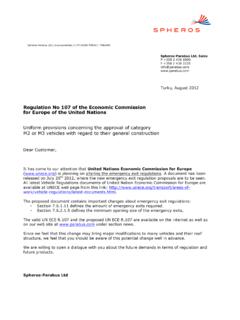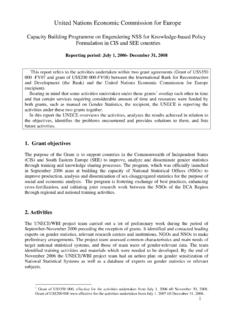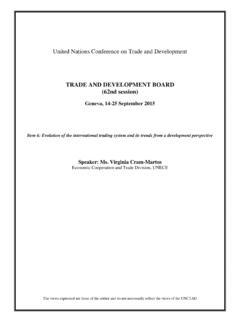Transcription of Interagency Collaboration for Single Window ... - UNECE
1 FACILITATIONIMPLEMENTATION GUIDETRADETHAILANDCASE STORIES1 UNECEU nited nations Economic for EuropeNational Single Window (THAINSW) is a successful Interagency Collaboration . It is a national flagship project set up to enhance trade facilitation in thailand with a vision of becoming the world-class logistics hub for Indochina. It is in accordance with the Agreement to Establish and Implement the ASEAN Single Window and builds support for the formation in 2015 of the ASEAN Economic Community (AEC).High-level Architecture of THAINSWTHAINSW has six major components:Component 1: National router, providing a standardized and regulated environment for the seamless and streamlined routing of data among government agencies and business communities related to import, export and logistics ser-vices;Component 2: Functional integrator and host, facilitating both process and data integration across information systems of participating agencies and businesses;Component 3: Information systems of participating agencies and businesses, such as Permit Applications, Customs Dec-laration Applications, e-Customs Paperless Service, Pay-ment Applications, and Tracking and Tracing; Component 4: International gateway, enabling a Single point of access to the ASEAN Single Window and other Single Win-dow systems outside ASEAN regions.
2 Component 5: An online repository of THAINSW documents, such as imple-mentation guidelines, laws, regulations, agreements, MoU, training materials, reference files, a na-tional standard data set, international standard code lists and study reports; andComponent 6: Electronic document submission channel, pro-vided by value-added service providers (VAS).The cost of putting in place Components 1-2 and 4-5 was about USD 14 million. It was funded solely by the Government of Thai-land, through Royal Thai Collaboration for Single Window Implementation: thailand s ExperienceOverview of THAINSWUNECEU nited nations Economic for Europe2 FACILITATIONIMPLEMENTATION GUIDETRADECASE STORIESTHAILANDC urrent Status of THAINSW and its ImpactsTHAINSW was launched in July 2008. It has enabled the secure exchange of trade and transport e-documents among govern-ment agencies and businesses, as well as fully automated customs clearance and release at 660 customs stations na-tionwide.
3 In November 2011, THAINSW had about 8,000 sub-scribers serving approximately 100,000 traders and 36 gov-ernment authorities involved in import, export, logistics and supply chains. All government agencies and traders can participate in the Sin-gle Window environment at no cost. Traders pay only a small fee for electronic document submission through VAS. For a transaction with data less 25 Kbytes, traders pay THB 25. They pay THB 1 for each additional Kbyte. The maximum charge is THB 300 regardless of the size of the in Customs Clearance ProcessesCustoms clearance (per declaration)Before 19981998-20072008-2011 GreenRedCustoms inter vention6-8 steps2-4 steps0 step1 stepIntervention time3 -10 d a y day0 hour No. of required documents5 documents1-3 documents0 document1 documentTurnaround time 3 -10 d a y s10-30 minutes95% in 5 minutesTHAINSW simplifies both processes and documents associated with international trade transactions.
4 It provides a significant reduction in the number of processes, documents, and time required for completing regulatory requirements at borders. THAINSW has enabled thailand to save logistics costs of about USD billion per Export and Import Performance*20 072008200920102011 Time to export (Days)2417141414No. of documents for export97444 Cost to export (USD)848615625625625 Time to import (Days)2214131313No. of documents for import129333 Cost to import (USD)1,042786795795795* Source: World Bank Doing Business Institutional Arrangements for NSW Implemen-tationThe implementation of NSW involves stakeholders from various government agencies as well as trade and transport commu-nities. Close Collaboration among these organizations is there-fore critical for project success. In thailand , Interagency Collaboration for NSW implementa-tion was arranged through various Resolutions. These serve as mechanisms to coordinate the efforts of stakeholders from public and private sectors at both managerial and operational levels.
5 They legitimize the establishment of necessary inter-agency collaborative platforms, provide mandates to desig-nated organizations, and give them the authority to put NSW in place. UNECEU nited nations Economic for Europe3 FACILITATIONIMPLEMENTATION GUIDETRADECASE STORIESTHAILANDList of Interagency Collaborative Platforms, their Membership, and MandatesInteragency Collaborative PlatformMandateNational Logistics Committee (Resolution issued by the Office of the Prime Minister)Chairmanship: Prime MinisterMembership: Permanent secretaries from trade and transport-related Ministries and representatives from trade and transport-related associations Develop strategies to drive logistics development Provide policy advice, Logistics Development Strategy, to the Cabinet Approve action plans in areas related to logistics development Support and monitor the implementation of the strategies and action plans Establish sub-committees to handle various aspects of logistics development Report progress to the CabinetSub-committee on Data Integration for Import, Export, and Logistics (Resolution issued by National Logistics Committee)Chairmanship: Permanent Secretary of Ministry of FinanceMembership.
6 Director Generals from government agencies that are involved in the administration of cross-border trade and representatives from trade and transport-related associations Develop the National Action Plan for the Implementation of THAINSW to Facilitate Import, Export, and Logistics as well as estimate budget required Propose recommendations for the revision of laws, rules and regulations, or revise them to enable NSW implementation Oversee NSW implementation Establish working groups to assist the sub-committee in carrying out its tasks Report progress to National Committee on Logistics DevelopmentSteering Committee on NSW Development (Resolution issued by Royal Thai Customs)Chairmanship: Director General, Royal Thai CustomsMembership: Representatives from government agencies participating in the NSW project as well as representatives from MICT, Bureau of Budget, Department of Business Development, and Bank of thailand Assist the sub-committee in the development of the action plan for NSW implementation Ensure that NSW is implemented according to the action plan Establish working groups to 1) analyse business processes and data under the scope of NSW implementation, and 2) develop data inter-operability framework that conforms with international standards and the Agreement and Protocol to Establish and Implement the ASEAN Single WindowTechnical Working Group (Resolution issued by Steering Committee on NSW Development)Chairmanship: Director, Information and Communication Technology Division, Royal Thai CustomsMembership.
7 Experts from government agencies involved in the administration of cross-border trade and representatives from trade and transport-related associations Develop standard-conformant guidelines that facilitate the sharing and exchange of data between NSW and participating information systems Develop standard-conformant guidelines that facilitate the deployment of PKI and digital signatures Develop a Nation Standard Data Set which involves the alignment of data formats with WCO Data Set, UNTDED, UN/CEFACT Core Component Library (CCL) and ASEAN Data Set Develop a data model to specify data structure and format to be used by NSW and participating information systems Provide a list of recommended changes to relevant laws, rules and regulations necessary for the operation of NSW Support cross-border data integration according to national policy directives and international agreements Complete the designated tasks within the specified timeframe Coordinate the integration of data with relevant agencies Report progress every 3 months to the Steering Committee on NSW Development Steering Committee on Regulatory Framework and Quality Assurance (Resolution issued by Royal Thai Customs)Chairmanship: Director General, Royal Thai CustomsMembership.
8 Experts from government agencies involved in the administration of cross-border trade and representatives from trade and transport-related associations Examine business processes related to the administration of international trade transactions and associated times, costs, fees, laws, rules, regulations, and the degree of difficulty in completing them Develop guidelines and standards for service delivery and propose them to relevant agencies for consideration Support, oversee and assess the performance of participating agencies against the defined guidelines and standards Report progress and difficulties to the Steering Committee on NSW Development every 2 monthsLegal Working Group (Resolution issued by Sub-committee on Data Integration for Import, Export, and Logistics)Chairmanship: Deputy Director General, Royal Thai CustomsMembership: Experts from Office of the Council of State of thailand , MICT, and government agencies that are involved in the administration of cross-border trade Revise existing laws, rules and regulations to support the integration of information that facilitates imports, exports and logistics ( , Electronic Transaction Act 2001 which is now under revision.)
9 The revised Act will further enhance information sharing in the paperless environment among relevant government and business sectors.)UNECEU nited nations Economic for Europe4 FACILITATIONIMPLEMENTATION GUIDETRADECASE STORIESTHAILANDE ngine of Interagency CollaborationProper institutional arrangements are necessary, but are not sufficient. They provide frameworks for the Collaboration , but not engines that drive the Collaboration toward its Interagency Collaboration for NSW implementation in thailand owes much to the roles of the National Economic and Social Development Board (NESDB), Royal Thai Customs, and the Ministry of Information and Communication Technol-ogy (MICT). Their roles, often performed by mid-rank govern-ment officials, not only keep all stakeholders engaged, make these stakeholders accountable for the project, and oblige them to collaborate, but also ensure the continuity of the NSW project when there are changes in government administra-tions.
10 The official mandate placed these government agencies in a strong position: NESDB, a government think-tank dealing with economic pol-icy, was designated as secretary to the National Logistics Committee. It supports this committee in developing strate-gies to drive logistics development, by preparing policy ad-vice to high-level decision makers, and advising the Cabinet of the status of logistics development. Its mandate allows NESDB to maintain political will and commitment for the project even in situations where turnover in ministerial and senior-official positions is high. Royal Thai Customs was appointed as secretary to the Sub-committee on Data Integration for Import, Export, and Lo-gistics. As such, it assisted the sub-committee in drafting the National Action Plan for the Implementation of thailand s NSW. To ensure that all sub-projects and budget plans from all participating government agencies were streamlined, Royal Thai Customs closely consulted government agencies participating in NSW implementation.










